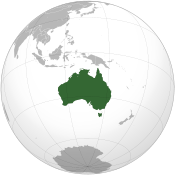UN adds to criticism of Australian offshore centers
Tuesday, February 5, 2013

(Image missing from Commons: image; log)
The United Nations High Commissioner for Refugees (UNHCR) echoed criticism from other human rights groups yesterday as its new report called on Australia to cease the practice of holding asylum seekers in an uncertain status in its offshore facilities.
The UNHCR spent three days in January at an Australian facility located on Manus Island, Papua New Guinea. Following Australian mandatory policy, the more than two hundred detainees held there were detained upon requesting asylum. More than 30 children are being held at this Australian facility. The UNHCR report raised the crowded conditions at the camp as a cause for concern, as well as the impact isolation could have on the children. Australia has another facility for asylum seekers on the island of Nauru. The UNHCR report made clear Australia does not have a process for clearing the asylum seekers, which means their detention in the camps is indefinite and a violation of international human rights.
Caught in the middle of the debate is the new immigration minister Brendan O'Connor. O'Connor was named immigration minister this weekend. The following night, a boat load of 60 refugees who were approached near Christmas Island sought asylum. Monday, the UNHCR issued its report. Union leaders, amongst them Brendan's brother Michael O'Connor who is national secretary of the Construction Forestry Mining and Energy Union, are calling for and end to current migration deals.
A report from Monash University found immigrants have taken 200,000 jobs created during the last two years, depressing employment of young, lower skilled Australians. Polls show a 70 percent majority of Australians stand opposed to the growth in population that will result from immigration.
Amnesty International points out that those migrants held in offshore processing facilities are not typical immigrants but rather asylum seekers. It says the latter category accounts for only three percent of Australia's influx from immigration. Moreover, Amnesty International says the practice of offshore facilities for asylum seekers runs afoul of Australia's own international agreements, such as the UN Refugee Convention, and laws, Australian Migration Act 1958.
In August, Prime Minister Julia Gillard indicated in talks with Nauru and Papua New Guinea that Australia was interested in quickly processing the asylum seekers.
Sources
- David Crowe. "Unions look for O'Connor to fight foreign workers" — The Australian, February 5, 2013
- Phil Mercer. "UN Criticizes Australian Offshore Asylum Camp" — VOA, February 4, 2013
- Paul Maley. "UN labels Manus a legal affront" — The Australian, February 4, 2013
- John Masanauskas. "Locals losing out on jobs because of high immigration" — Herald Sun, February 4, 2013
- Milanda Rout. "Picture opportunity caps tumultuous week for Labor" — The Australian, February 4, 2013
- Michael Gordon. "O'Connor takes on a boatload of problems" — The Canberra Times, February 3, 2013
- "Our campaign for refugees and asylum seekers" — Amnesty International Australia, January 30, 2013
- AAP. "Gillard assures PNG, Nauru on length of detention of asylum-seekers" — news.com.au, August 29, 2012
External Links
- UNHCR Mission to Manus Island, Papua New Guinea, 15-17 January 2013 (Embargoed until Monday, February 4, 2013) — Retrieved Tuesday, February 5, 2013 (9:54 a.m. EST)
- UNHCR Mission to the Republic of Nauru, 3-5 December 2012, Report — Retrieved Tuesday, February 5, 2013 (9:40 a.m. EST)


